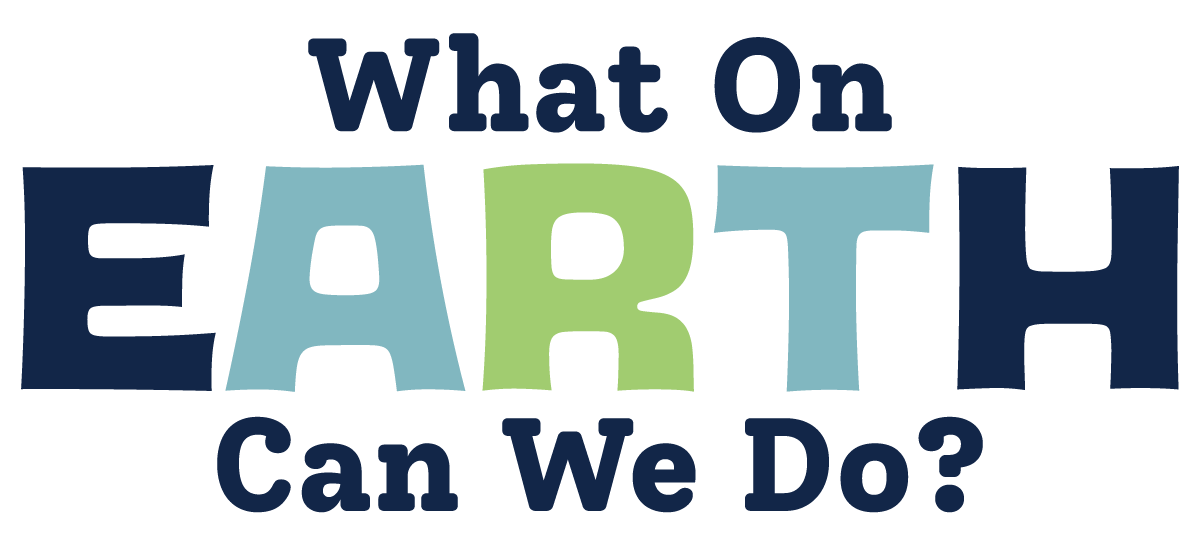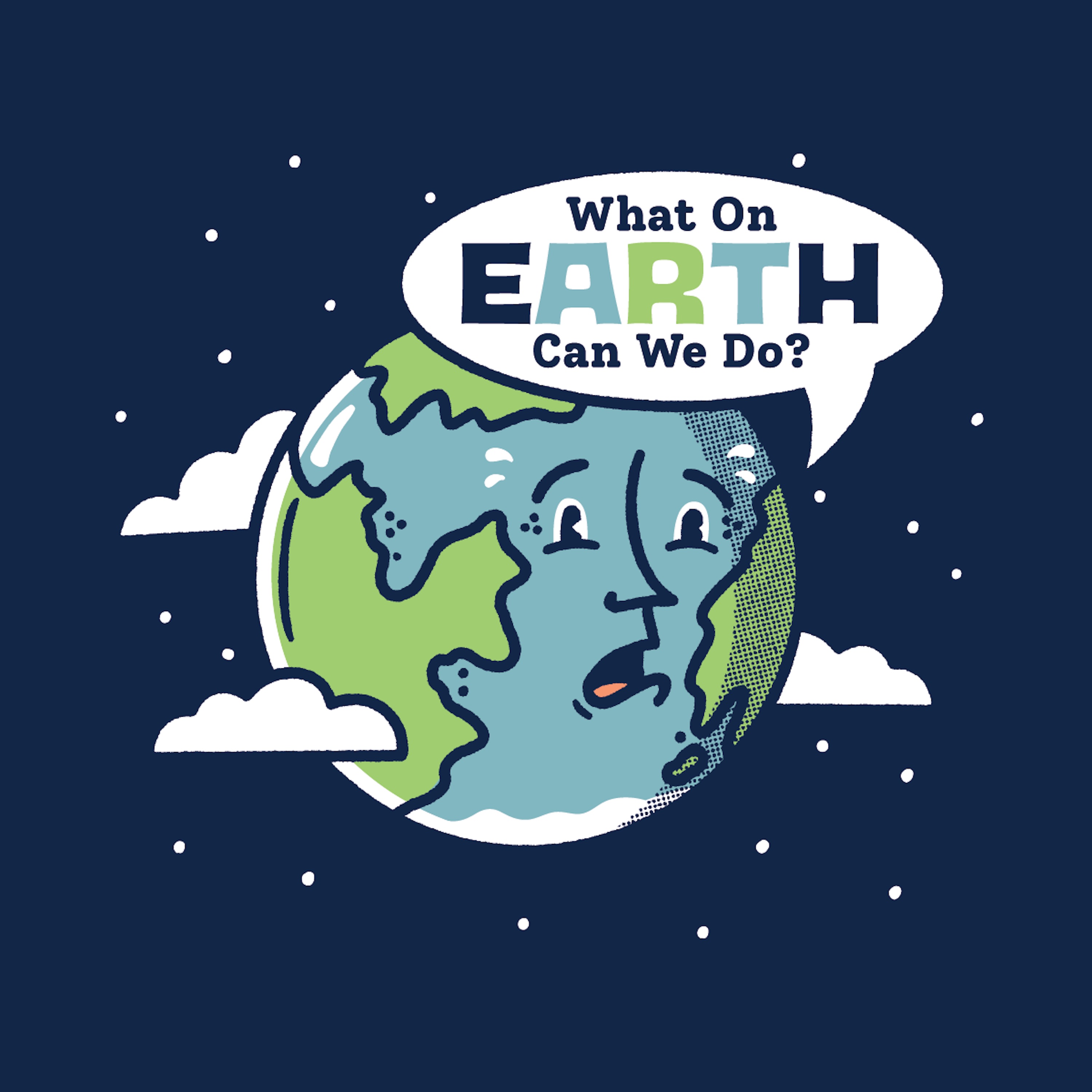Episode 1
The Truth About Food Waste
Food waste is everywhere, from farms to our own kitchens, but what does it actually mean, and why is it so hard to track?
In the first episode of Season 7, host Bri Huot-Boer speaks with Dr. Kate Parizeau from the University of Guelph to unpack the basics: what food waste is, where it happens, and why Canada is still struggling to measure it. This conversation sets the stage for our season-long focus on food waste and the solutions that can make a difference!
Resources:
- Second Harvest
- The Avoidable Crisis of Food Waste (2024)
- National Zero Waste Council
- Circular Innovation Council
The What On EARTH Can We Do? podcast is a program of the Alberta Emerald Foundation (AEF), a registered charity dedicated to accelerating environmental excellence across Alberta.
Thank You to Our Sponsors:
Capital Power, Government of Alberta, the Forest Resource Improvement Association of Alberta, Pathways Alliance, City of Edmonton, TD Friends of the Environment, and City of Calgary
Disclaimer:
The views and opinions expressed by our guests do not necessarily reflect those of the Alberta Emerald Foundation. As a non-partisan organization, we are committed to presenting diverse perspectives on environmental issues.
Transcript
Where is it happening, and why this season on what on earth can we do? We are focusing entirely on food waste. Over the next few episodes, we'll speak with experts and change makers who are helping us understand the problem and spearheading solutions already making a difference here in Alberta.
I'm Bri, the host of What On Earth can we Do? To kick things off, I'm joined by Dr. Kate Parizeau, a researcher and professor from the University of Guelph who studies food waste and waste systems across Canada. In part one of our two-part conversation, we are digging into the basics, what food waste is, where it comes from, and why we're still struggling to track it.
Bri Huot: Hi Dr. [:When we talk about food waste, when we say food waste. What exactly are we talking about? How do we define that?
Dr. Parizeau: Mm-hmm. There are many different definitions out there, and a lot of them are suited to particular context. I think for our conversation today, a good way to think about food waste is food that was produced for human consumption that wasn't eaten by people A.
So some people might say, you know, if you take that food that wasn't eaten and you give it to animals, for example, that that doesn't count as food waste. And others would say, well, yes it is. So we can get into the specifics here, but broadly what we're talking about is a greenhouse gas intensive process of generating food that had a certain purpose and then it's not being used for that purpose.
Um, and how do they show up [:Dr. Parizeau: There are lots of different ways that we can talk about or categorize food waste. One distinction that, um, people often make when they're studying this issue is they'll talk about food loss versus food waste.
And so generally speaking, food loss happens earlier in the food value chain. So this is food, for example, that couldn't be harvested or wasn't properly transported from the farm to a storage facility or wasn't stored properly. So we usually think of that as food loss. And then food waste happens a little bit later on in the food value chain, and it's often described as something that's consumer facing.
So when people go to the grocery store and buy food and then don't eat it, or if you go to a restaurant and eat part of the food on your plate, the rest is food waste. So that's one way that we can think about different categories of food waste. Another one that's really important for most people working operationally in this space is to think about food loss and waste being avoidable or unavoidable.
So [:we still wanna compost it rather than putting it in the landfill, for example. But it's harder to prevent that kind of food waste. If we compare that to avoidable food waste, then that's something that we can do something about. It's the banana inside that peel. It's the egg inside those eggshells that we're not going to eat.
And so a lot of times, uh, when we're talking about statistics or the impacts of food loss and waste, we tend to focus on the avoidable portion of that food loss and waste.
Bri Huot: So you've kind of walked us through that process of farm to table and food loss versus food waste, which I think is quite interesting, the distinction between the two.
or this waste is happening. [:Dr. Parizeau: And I'm getting, I can give you some sense of it, but in reality, one of the big problems that we face, both as researchers and as people working in this space, whether that's policy makers or people trying to make a difference, we don't have great data and we don't have equal data across the entire food system.
So there are some big picture estimates out there. Um, but for example, if we're even just talking about the total amount of food loss in waste In Canada, I've seen estimates between 12 million to 36 million tons a year. That's a huge range. And so similarly, when we talk about different segments of the food value chain, we have some estimates,
re food loss and waste occur [:So a lot of the information that I would, uh, recommend we look at would be the estimates that they've generated. So we know, for example, that there's food loss and waste on farms, but again, the, the question is what actually counts as food loss and waste? If there's something that couldn't be harvested, if it was, uh, something that happened on the farm or there was a drought or something and then the farmer said, you know what?
I'm not gonna harvest that food. I'm just gonna till it back under. Does that count as food loss and waste, or does it count as soil amendment? So generally speaking, we don't see a lot of waste on a farm, even when there is food that we can't eat because of the way that it's used again. Where we do start to see more food loss and waste are at places like processing and manufacturing.
t there's a big bump around, [:And so about 12% of food loss and waste occurs when those apples are being graded. And then whether, uh, whether or not they're being stored properly, that could also generate food loss and waste. The other really big place where we see food loss in waste is in households, so in consumers in their homes. So we, we do see food waste at other points along the way, places like transportation, distribution, retail, but those are much smaller numbers compared to those hotspots of processing and manufacturing, uh, storage and grading and household.
Bri Huot: Yeah, that's a great, that's kind of seems like there's big three big tiers, but a lot of it is happening in the manufacturing and at the home, which is quite interesting. Um, and so talking about those three tiers and the percentage of food waste or food loss that they're responsible for, how much food do we waste across Canada and is Alberta any different?
o the estimates vary quite a [:And similarly in Alberta, there's not. Great recent data. There was a study, uh, done by provincial ministry in 2015, so 10 years ago. That suggests it's in the range of 3 million dry organic tons per year. So that, I mean, it's still pretty substantial, even if we don't know the exact numbers, it's a lot a heck of a lot.
Bri Huot: So is there a particular reason why this isn't studied, why we don't have that data? Is it just maybe a lack of resources or a lack of desire to do that?
Dr. Parizeau: Mm-hmm. I think it's a number of different things. So when we're researching this issue, our group talks about this as a complex or wicked problem.
will require many different [:So I think that's one distortion that we can see sometimes where, you know, that environmental outcome is not the, the main priority. I think also a big issue is that it's pretty invisible, it's not something that a lot of people know about. The lack of data also allows it to be invisible. So, as I said, there's, there's not a lot of data out there.
Most governments don't compel reporting, at least not from all sectors. They might compel reporting from some sectors. And so I think that we as a society don't yet realize what a big deal food loss and waste is, and it's many impacts. Environmental, uh, economic, logistical. We just don't recognize what a big deal it is yet.
we've talked about research, [:Dr. Parizeau: Yes, we do some work on this topic. We have colleagues, um, at Simon Fraser and at the University of Toronto who also do some research on this. Organizations that have been putting a lot of time and energy into this topic include the National Zero Waste Council, they have, uh, historically been doing a lot of work on this topic.
They also, um, franchise the Love Food Hate Waste, uh, informational campaign, which has now been passed on to food mesh, which is in British Columbia, and so that's a big educational resource. In Ontario, we have the Ontario Food Collaborative, it's a group of, uh, municipal waste managers and also public health managers working together to address, um, food waste from an environmental perspective, but also from a public health issue saying this is nutrition that people aren't receiving.
, The [:Bri Huot: So when we're looking at it from, from this broader perspective and maybe backing up a little bit, um, what are some of the common reasons that food waste occurs?
I know that we've talked a little bit about grading. When it gets to the manufacturing or it gets to the, um, to the grocery stores, they wanna pick and choose what looks the best, so, where in the manufacturing process as well as at home, how, how is it occurring? Where, where are we getting all these, this food waste from?
usually not what best before [:Uh, and so we have a lot of food that's being discarded. Both in homes, but also higher up in the food value chain because of those best before dates. The second harvest, uh, report tells us that there's human error across the food value chain that also leads to, uh, food loss and waste. So, for example, food that needs to be kept in a cold chain.
The cold chain is broken, all that food is wasted. Um, issues with poor storage and inventory management. So those are sort of the higher up the food chain reasons. And then once we get to the human behavior side too, there are things, uh, like habits and convenience, lifestyles that we have. So even if people care about environmental issues or they care about preventing food waste, it might be even more important that they can get a fast meal on the table that they know everybody in their household wants to eat.
food prices have been going [:Food used to be relatively a lot more expensive for us as a species. Mm-hmm. And so now, you know, even when food is more expensive, there are other pressures in our lives that mean that reducing food waste and saving that little bit of money is not the most important thing for many different households.
Bri Huot: Yeah, absolutely, convenience plays a, plays a huge role. And even myself looking at my habits and my behaviors, even as someone who really is passionate about food waste and tries my hardest to reduce it, it's, it's so hard. You go to the grocery store, you have your grocery list, and I, me personally, I have, okay, Monday I'm making this, and then I'll have the leftovers on Wednesday and, and so on and so forth.
eat them maybe during lunch [:And that, that convenience factor and, and speaking of the best before dates, that's something in my research for this episode that came up a lot and me personally. I think of best before dates as, as a guideline. I use my nose and my eyes, uh, and even my taste to be like, okay, did this actually go bad? You know, at the grocery store sometimes you'll see they do 50% off, um, if it's expiring the next, or expiring if it's best before the next day.
And I find I use that as a great way to, to reduce my grocery bill and also, you know, get the food that I want, um, and, and maybe save it from being thrown away at the grocery store.
Dr. Parizeau: Yeah, I think those are really great examples, and I think part of what your, uh, what your stories are pointing out to us is that even when people care, there's a big issue for us as consumers, right?
out our individual behavior. [:You know, we can trust that it was in a cold chain, but then all we have is this little number on the carton that says it's best before this date, right? We don't have that same like embodied knowledge of where it came from, and the same is true so many things when we're buying produce. You buy a clamshell of
spinach and you think, oh, this is gonna last me however long, but actually you don't know how long it's been since it was harvested. There are times where I would buy that clam shell spinach and it would go bad before the best before date, right? There are so many ways that even when we care, we can't make those structural decisions at the grocery store or you know, it used to be that you could go to the grocery store and you could pick a quantity of something, and now you have to buy the entire clamshell.
h me named Carly Fraser, who [:Bri Huot: That's a great point. You know, I think about that often when I'm going somewhere. Uh, it's just me and, and my partner who I live with, and I'm like, I'm not going to eat this entire thing. I, I know I can't, but I need this for my recipe. And you can try and build in different recipes throughout your week to try and use it.
Just the demands on us as individuals through work and social settings to try and build in all of these other elements of reducing food waste can be so difficult for some people who may not have the time. And to, to that point in this conversation we we're having right now, are we as Canadians getting better at recognizing this issue and, and maybe taking action on it?
think we're talking about it [:So I think people are starting to talk more about it. We're still wasting a whole lot, and so part of that is that it might take time between people's awareness raising and their behaviors changing. But again, a big part of it is that these are structural factors, they're things that individuals can't change.
Systems need to change. So I am hopeful, but I still think that the momentum is that we are, uh, very wasteful country when it comes to food.
Bri Huot: Well, I'm really looking forward to, uh, our next conversation, which will be the next part of this interview, where we're gonna chat about the challenges, what are the impacts of food loss and food waste, and ways maybe structurally and individually, that we can change that and, and help to reduce the impacts.
for this first installment. [:That's it for part one of my conversation with Dr. Kate Parizeau. In part two, we'll look at what all this waste is really costing us environmentally, economically, and socially. And we'll explore what can be done at every level to make a difference.
To learn more about what we talked about in this episode, check out the show notes. The What on Earth can We Do? Podcast is a program of the Alberta Emerald Foundation, a registered charity focused on accelerating environmental excellence across Alberta. To learn more about the Alberta Emerald Foundation, head to our website, emerald foundation.ca, or follow us on social media @ Alberta Emerald.
A big thank you to our sponsors who make this podcast possible, the Government of Alberta, the Forest Resource Improvement Association of Alberta Pathways Alliance, the City of Edmonton, the City of Calgary, and TD Friends of the Environment Foundation. See you next time.
[:

